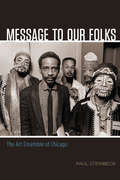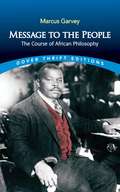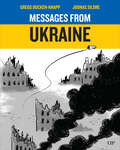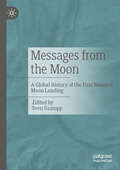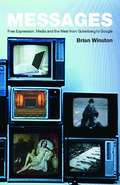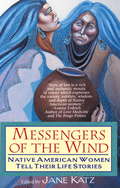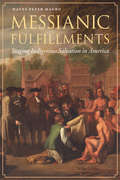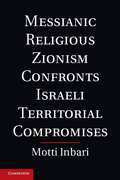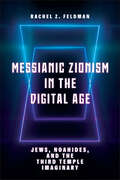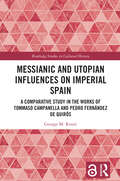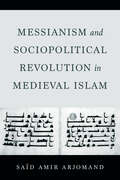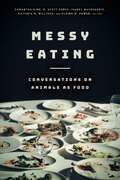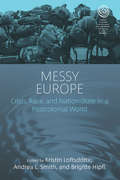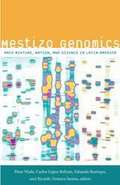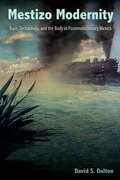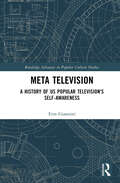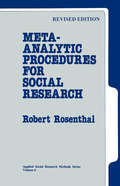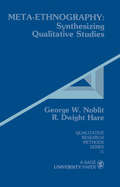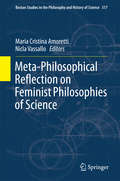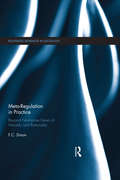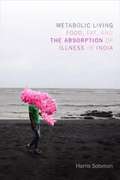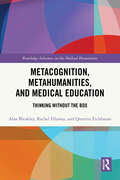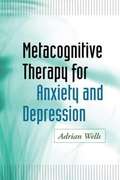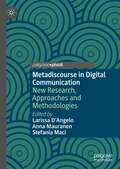- Table View
- List View
Message to Our Folks: The Art Ensemble of Chicago
by Paul SteinbeckThis year marks the golden anniversary of the Art Ensemble of Chicago, the flagship band of the Association for the Advancement of Creative Musicians. Formed in 1966 and flourishing until 2010, the Art Ensemble distinguished itself by its unique performance practices—members played hundreds of instruments on stage, recited poetry, performed theatrical sketches, and wore face paint, masks, lab coats, and traditional African and Asian dress. The group, which built a global audience and toured across six continents, presented their work as experimental performance art, in opposition to the jazz industry’s traditionalist aesthetics. In Message to Our Folks, Paul Steinbeck combines musical analysis and historical inquiry to give us the definitive study of the Art Ensemble. In the book, he proposes a new theory of group improvisation that explains how the band members were able to improvise together in so many different styles while also drawing on an extensive repertoire of notated compositions. Steinbeck examines the multimedia dimensions of the Art Ensemble’s performances and the ways in which their distinctive model of social relations kept the group performing together for four decades. Message to Our Folks is a striking and valuable contribution to our understanding of one of the world’s premier musical groups.
Message to the People: The Course of African Philosophy (Dover Thrift Editions: Black History #No. 7)
by Marcus GarveyIn 1937, Marcus Garvey, founder of the Universal Negro Improvement Association and one of the most controversial figures in the history of race relations, assembled his most trusted organizers to impart his life's lessons. For one month he instructed this elite student body — at its peak the largest international mass movement of African peoples — on topics ranging from universal knowledge and how to attain it to leadership, character, God, and the social system. A crucial guide to the understanding of Garvey's philosophy and teachings, Message to the People features profound insights into the nascent days of the Civil Rights movement. This volume will prove an enlightening companion to students of African American and twentieth-century history.
Messages from Ukraine (ethnoGRAPHIC)
by Gregg Bucken-Knapp Joonas SildreOn February 24, 2022, Russia launched a full-scale invasion of Ukraine that dominated headlines around the world. Millions of Ukrainians would flee the country, and a third of the population would be displaced. In the days following the invasion, Swedish migration expert Gregg Bucken-Knapp sent text messages to his Ukrainian colleagues, offering support and assistance. These were their responses. In a series of graphic vignettes, Messages from Ukraine takes the words of Ukrainian migration professionals and transforms them into snapshots of how war affects the lives of everyday people: those who are forced to flee home and seek safety elsewhere, those who choose to stay and volunteer or fight, those who witness events unfolding from afar, and those who find themselves trapped in cities under siege. Messages from Ukraine captures a moment in time to tell a timeless story about war, displacement, determination, and resilience. Proceeds from the sale of Messages from Ukraine will go to the Canada-Ukraine Foundation, a national charitable foundation that provides humanitarian aid to the people of Ukraine.
Messages from the Moon: A Global History of the First Manned Moon Landing
by Sven GramppIn this anthology, a journey around the world and through time is undertaken in 21 countries on no less than six continents. In this way, the global reception of one of the biggest media events to date is given contour. Based on the coverage of the first manned moon landing, the global history of the Cold War at the time of the Space Race can be told in its many different local facets as well as in its worldwide interconnectedness.Against the backdrop of current efforts by various countries to return to the moon or even to establish a space army, as well as in view of the extremely tense geopolitical situation, which is already being invoked in many places as 'Cold War 2.0', such a global look back to the time of 'Cold War 1.0' certainly seems relevant in order to better understand the present and near future of political (media) cultures.
Messages: Free Expression, Media and the West from Gutenberg to Google
by Brian WinstonEasy to read, and highly topical, Messages writes a history of mass communication in Europe and its outreaches, as a search for the origins of media forms from print and stage, to photography, film and broadcasting. Arguing that the development of the mass media has been an essential engine driving the western concept of an individual, Brian Winston examines how the right of free expression is under attack, and how the roots of media expression need to be recalled to make a case for the media’s importance for the protection of individual liberty. Relating to the US constitution, and key laws in the UK which form the foundation of our society, this is a highly useful book for students of media, communication, history, and journalism.
Messengers of the Wind
by Jane Katz"Messengers of the Wind goes beyond the autobiographies of everyday women. These are women who have long been an invisible part of American culture. Their stories are haunting, frightening, encouraging, and courageous. . . . Katz is a faithful guide."--The Minnesota DailyIn Messengers of the Wind, Native American women, old and young, from a variety of tribal groups, speak with eloquence and passion about their experience on the land and in urban areas; about their work as artists, activists, and healers; as grandmothers, mothers, and daughters; as modern women with a link to the past. And as each woman, renowned and obscure, tells her remarkable personal story, it is clear that each has tapped into the power that comes from within and has reached back into a history that brings with it courage and hope." 'Giving energy to Mother Earth' -- Yes. That is our duty as women, as Natives, and as human beings. Messengers of the Wind is a way of doing just that. It is not a dance, feet patting our mother, but it is an offering, the voices of the women sent to comfort her. Thank-you, Jane Katz, for your offering. It is a special and much-needed gift."--Paula Gunn Allen Author of Voice of the Turtle"COMPELLING. . . INTIMATE."--The Cleveland Plain Dealer"A RICH COLLECTION OF PERSONAL STORIES. . .REWARDING. . . These are powerful women with important stories to tell."--Kirkus ReviewsFrom the Trade Paperback edition.
Messianic Fulfillments: Staging Indigenous Salvation in America
by Hayes Peter MauroIn Messianic Fulfillments Hayes Peter Mauro examines the role of Christian evangelical movements in shaping American identity in the seventeenth, eighteenth, and nineteenth centuries. Focusing on Christianity’s fervent pursuit of Native American salvation, Mauro discusses Anglo American artists influenced by Christian millenarianism, natural history, and racial science in America. Artists on the colonial, antebellum, and post–Civil War frontier graphically projected their idealization of Christian-based identity onto the bodies of American Indians.Messianic Fulfillments explores how Puritans, Quakers, Mormons, and members of other Christian millenarian movements viewed Native peoples as childlike, primitive, and in desperate need of Christianization lest they fall into perpetual sin and oblivion and slip into eternal damnation. Christian missionaries were driven by the idea that catastrophic Native American spiritual failure would, in Christ’s eyes, reflect on the shortcomings of those Christians tasked with doing the work of Christian “charity” in the New World. With an interdisciplinary approach drawing from religious studies and the histories of popular science and art, Messianic Fulfillments explores ethnohistorical encounters in colonial and nineteenth-century America through the lens of artistic works by evangelically inspired Anglo American artists and photographers. Mauro takes a critical look at a variety of visual mediums to illustrate how evangelical imagery influenced definitions of “Americaness,” and how such images reinforced or challenged historically prevailing conceptions of what it means (and looks like) to be American.
Messianic Religious Zionism Confronts Israeli Territorial Compromises
by Motti InbariThe Six Day War in 1967 profoundly influenced how an increasing number of religious Zionists saw Israeli victory as the manifestation of God's desire to redeem God's people. Thousands of religious Israelis joined the Gush Emunim movement in 1974 to create settlements in territories occupied in the war. However, over time, the Israeli government decided to return territory to Palestinian or Arab control. This was perceived among religious Zionist circles as a violation of God's order. The peak of this process came with the Disengagement Plan in 2005, in which Israel demolished all the settlements in the Gaza Strip and four settlements in the West Bank. This process raised difficult theological questions among religious Zionists. This book explores the internal mechanism applied by a group of religious Zionist rabbis in response to their profound disillusionment with the state, reflected in an increase in religious radicalization due to the need to cope with the feelings of religious and messianic failure.
Messianic Zionism in the Digital Age: Jews, Noahides, and the Third Temple Imaginary
by Rachel Z. FeldmanJudaism in the twenty-first century has seen the rise of the messianic Third Temple movement, as religious activists based in Israel have worked to realize biblical prophecies, including the restoration of a Jewish theocracy and the construction of the third and final Temple on Jerusalem’s Temple Mount. Through groundbreaking ethnographic research, Messianic Zionism in the Digital Age details how Third Temple visions have gained considerable momentum and political support in Israel and abroad . The role of technology in this movement’s globalization has been critical. Feldman skillfully highlights the ways in which the internet and social media have contributed to the movement's growth beyond the streets of Jerusalem into communities of former Christians around the world who now identify as the Children of Noah (Bnei Noah). She charts a path for future research while documenting the intimate effects of political theologies in motion and the birth of a new transnational Judaic faith.
Messianic and Utopian Influences on Imperial Spain: A Comparative Study in the Works of Tommaso Campanella and Pedro Fernández de Quirós (Routledge Studies in Cultural History)
by George M. RoureRoure draws a novel connection between Tommaso Campanella’s utopian ideas for Imperial Spain and Catholicism and Portuguese navigator Pedro Fernández de Quirós’ vision of an idyllic society and a mythical city of New Jerusalem in the antipodes.The book presents newfound evidence suggesting Spain experimented with Messianism to secure their empire in the late Renaissance. The case is made that the Spanish monarchy contemplated Campanella’s Messianic ideas and sent Quirós to initiate them on the imagined Terra Australis Incognita. Campanella and Quirós shared idiosyncratic beliefs that by means of divine providence Spanish power would imminently transform the world, elevate humanity to a higher spiritual plane, dominate politics and religion, and prepare for the second coming. The work advances our understanding of previously unknown links amongst Campanella’s religious solutions for idealising temporal government, Quirós’s objective of a utopian society in the great south land, and Spain’s tentative experimentation with Messianism. It also permits the drawing of inferences on the possible rationale behind political messianism in the contemporary world.This book is a valuable resource for scholars, students, researchers, and professionals interested in European and World History of the late Renaissance as well as those interested in the religious and political imperatives of Imperial Spain during the Habsburg period.
Messianism and Sociopolitical Revolution in Medieval Islam
by Said Amir ArjomandThis study of messianism and revolution examines an extremely rich though unexplored historical record on the rise of Islam and its sociopolitical revolutions from Muhammad’s constitutive revolution in Arabia to the Abbasid revolution in the East and the Fatimid and Almohad revolutions in North Africa and the Maghreb. Bringing the revolutions together in a comprehensive framework, Saïd Amir Arjomand uses sociological theory as well as the critical tools of modern historiography to argue that a volatile but recurring combination of apocalyptic motivation and revolutionary action was a driving force of historical change time and again. In addition to tracing these threads throughout 500 years of history, Arjomand also establishes how messianic beliefs were rooted in the earlier Judaic and Manichaean notions of apocalyptic transformation of the world. By bringing to light these linkages and factors not found in the dominant sources, this text offers a sweeping account of the long arc of Islamic history.
Messy Eating: Conversations on Animals as Food
by Samantha King R. Scott Carey Isabel Macquarrie Elaine M. Power Victoria N. MilliousLiterature on the ethics and politics of food and that on human–animal relationships have infrequently converged. Representing an initial step toward bridging this divide, Messy Eating features interviews with thirteen prominent and emerging scholars about the connections between their academic work and their approach to consuming animals as food. The collection explores how authors working across a range of perspectives—postcolonial, Indigenous, black, queer, trans, feminist, disability, poststructuralist, posthumanist, and multispecies—weave their theoretical and political orientations with daily, intimate, and visceral practices of food consumption, preparation, and ingestion. Each chapter introduces a scholar for whom the tangled, contradictory character of human–animal relations raises difficult questions about what they eat. Representing a departure from canonical animal rights literature, most authors featured in the collection do not make their food politics or identities explicit in their published work. While some interviewees practice vegetarianism or veganism, and almost all decry the role of industrialized animal agriculture in the environmental crisis, the contributors tend to reject a priori ethical codes and politics grounded in purity, surety, or simplicity. Remarkably free of proscriptions, but attentive to the Eurocentric tendencies of posthumanist animal studies, Messy Eating reveals how dietary habits are unpredictable and dynamic, shaped but not determined by life histories, educational trajectories, disciplinary homes, activist experiences, and intimate relationships. These accessible and engaging conversations offer rare and often surprising insights into pressing social issues through a focus on the mundane—and messy— interactions that constitute the professional, the political, and the personal. Contributors: Neel Ahuja, Billy-Ray Belcourt, Matthew Calarco, Lauren Corman, Naisargi Dave, Maneesha Deckha, María Elena García, Sharon Holland, Kelly Struthers Montford, H. Peter Steeves, Kim TallBear, Sunaura Taylor, Harlan Weaver, Kari Weil, Cary Wolfe
Messy Europe: Crisis, Race, and Nation-State in a Postcolonial World (EASA Series #32)
by Kristín Loftsdóttir Andrea L. Smith Brigitte HipflUsing the economic crisis as a starting point, Messy Europe offers a critical new look at the issues of race, gender, and national understandings of self and other in contemporary Europe. It highlights and challenges historical associations of Europe with whiteness and modern civilization, and asks how these associations are re-envisioned, re-inscribed, or contested in an era characterized by crises of different kinds. This important collection provides a nuanced exploration of how racialized identities in various European regions are played out in the crisis context, and asks what work “crisis talk” does, considering how it motivates public feelings and shapes bodies, boundaries and communities.
Mestizo Genomics: Race Mixture, Nation, and Science in Latin America
by Carlos López López Beltrán Peter Wade Ricardo Ventura Santos Eduardo RestrepoIn genetics laboratories in Latin America, scientists have been mapping the genomes of local populations, seeking to locate the genetic basis of complex diseases and to trace population histories. As part of their work, geneticists often calculate the European, African, and Amerindian genetic ancestry of populations. Some researchers explicitly connect their findings to questions of national identity and racial and ethnic difference, bringing their research to bear on issues of politics and identity.Drawing on ethnographic research in Brazil, Colombia, and Mexico, the contributors to Mestizo Genomics explore how the concepts of race, ethnicity, nation, and gender enter into and are affected by genomic research. In Latin America, national identities are often based on ideas about mestizaje (race mixture), rather than racial division. Since mestizaje is said to involve relations between European men and indigenous or African women, gender is a key factor in Latin American genomics and in the analyses in this book. Also important are links between contemporary genomics and recent moves toward official multiculturalism in Brazil, Colombia, and Mexico. One of the first studies of its kind, Mestizo Genomics sheds new light on the interrelations between "race," identity, and genomics in Latin America.Contributors. Adriana Díaz del Castillo H., Roosbelinda Cárdenas, Vivette García Deister, Verlan Valle Gaspar Neto, Michael Kent, Carlos López Beltrán, María Fernanda Olarte Sierra, Eduardo Restrepo, Mariana Rios Sandoval, Ernesto Schwartz-Marín, Ricardo Ventura Santos, Peter Wade
Mestizo Modernity: Race, Technology, and the Body in Post-Revolutionary Mexico (Reframing Media, Technology,and Culture in Latin/o America)
by David S. DaltonHonorable Mention, Latin American Studies Association Mexico Section Best Book in the Humanities After the end of the Mexican Revolution in 1917, postrevolutionary leaders hoped to assimilate the country’s racially diverse population into one official mixed-race identity—the mestizo. This book shows that as part of this vision, the Mexican government believed it could modernize “primitive” Indigenous peoples through technology in the form of education, modern medicine, industrial agriculture, and factory work. David Dalton takes a close look at how authors, artists, and thinkers—some state-funded, some independent—engaged with official views of Mexican racial identity from the 1920s to the 1970s. Dalton surveys essays, plays, novels, murals, and films that portray indigenous bodies being fused, or hybridized, with technology. He examines José Vasconcelos’s essay “The Cosmic Race” and the influence of its ideologies on mural artists such as Diego Rivera and José Clemente Orozco. He discusses the theme of introducing Amerindians to medical hygiene and immunizations in the films of Emilio “El Indio” Fernández. He analyzes the portrayal of indigenous monsters in the films of El Santo, as well as Carlos Olvera’s critique of postrevolutionary worldviews in the novel Mejicanos en el espacio. Incorporating the perspectives of posthumanism and cyborg studies, Dalton shows that technology played a key role in race formation in Mexico throughout the twentieth century. This cutting-edge study offers fascinating new insights into the culture of mestizaje, illuminating the attitudes that inform Mexican race relations in the present day. A volume in the series Reframing Media, Technology, and Culture in Latin/o America, edited by Hector Fernandez L'Hoeste and Juan Carlos Rodriguez
Mestizo State: Reading Race in Modern Mexico
by Joshua LundThe Mestizo State examines how the ideas, images, and public discourse around race, nation, and citizen formation have been transformed in Mexico from the mid-nineteenth century to the present. Starting with the Porfiriato, Joshua Lund investigates the rise of a racialized &“mestizo state,&” its reinvention after the Mexican Revolution, and its mobilization as a critical lever that would act both on behalf of and against mainstream Mexican political culture during the long hegemony of the Partido Revolucionario Institucional.Lund takes race as his object of critical reflection in the context of modern Mexico. An analysis that does not confuse race with mestizaje, indigeneity, African identity, or whiteness, the book sheds light on the history of the materialism of race as it unfolds within the cultural production of modern Mexico, grounded on close readings of four writers whose work explicitly challenged the politics of race in Mexico: Luis Alva, Ignacio Manuel Altamirano, Rosario Castellanos, and Elena Garro. In seeking to address race as a cultural-political problematic, Lund considers race as integral to the production of the materiality of Mexican national history: constitutive of the nation form, a mediator of capitalist accumulation, and a central actor in the rise of modernity.
Meta Television: A History of US Popular Television's Self-Awareness (Routledge Advances in Popular Culture Studies)
by Erin GianniniThe idea of metatextuality is frequently framed as a recent television development and often paired with the idea that it represents genre exhaustion. US television, however, with its early “live” performances and set-bound sitcoms, always suggested an element of self-awareness that easily shaded into metatextuality even in its earliest days. Meta Television thus traces the general history of US television’s metatextuality throughout television’s history, arguing that TV’s self-awareness is nothing new—and certainly not evidence of a period of aesthetic exhaustion—but instead is woven into both its past and present practice, elucidated through case studies featuring series from the 1970s to the present day—many of which have not been critically analyzed before—and the various ways they deploy metatext to both construct and deconstruct their narratives. Further, Meta Television asserts that this re- and de-construction of narrative and production isn’t just a reward to the savvy and/or knowledgeable viewer (or consumer), but seeks to make broader points about the media we consume—and how we consume it.This book explores the ways in which the current metatextual turn, in both the usual genres in which it appears (horror and sci-fi/fantasy) and its movement into drama and sitcom, represents the next turn in television’s inherent self-awareness. It traces this element throughout television’s history, growing from the more modest reflexivity of programs’ awareness of themselves, as created objects in a particular medium, to the more significant breaking of the fictive illusion and therefore the perceived distance between the audience and the series. Erin Giannini shows how the increased currency of metatextual television in the contemporary era can be tied to a viewership well-versed in its stories and production as well as able and willing to “talk back” via social media. If television reflects culture to a certain extent, this increased reflexivity mirrors that “responsive” audience as a consequence of the lack of distance that metafiction embraces.As Robert Stam traced the use—and implications—of reflexivity in film and literature, this book does the same for television, further problematizing John Ellis’s glance theory in terms of both production and spectatorship.
Meta-Analytic Procedures for Social Research
by Dr Robert RosenthalPraised in the first edition for the clarity of his general framework for conceptualizing meta-analysis, Rosenthal's revised edition covers the latest techniques in the field, such as a new effect size indicator for one size data, a new coefficient of robustness of replication, new procedures for combining and comparing effect sizes for multiple dependent variables, and new data on the magnitude of the problem of incomplete retrieval (the file drawer problem).
Meta-Ethnography: Synthesizing Qualitative Studies
by George Noblit R HareThis provocative volume deals with one of the chief criticisms of ethnographic studies, a criticism which centres on their particularism or their insistence on context -- the question is asked: How can these studies be generalized beyond the individual case? Noblit and Hare propose a method -- meta-ethnography -- for synthesizing from qualitative, interpretive studies. They show that ethnographies themselves are interpretive acts, and demonstrate that by translating metaphors and key concepts between ethnographic studies, it is possible to develop a broader interpretive synthesis. Using examples from numerous studies, the authors illuminate how meta-ethnography works, isolate several types of meta-ethnographic study and provide a theoretica
Meta-Philosophical Reflection on Feminist Philosophies of Science
by Maria Cristina Amoretti Nicla VassalloThis volume offers a meta-philosophical reflection on feminist philosophies of science. It emphasizes and discusses both the connections and differences between "traditional" philosophies of science and feminist philosophies of science. The collection systematically analyses feminist contributions to the various philosophies of specific sciences. Each chapter is devoted to a specific area of philosophy of science: general philosophy of science, philosophy of biology, philosophy of climate sciences, philosophy of cognitive sciences and neurosciences, philosophy of economics, philosophy of history and archaeology, philosophy of logic and mathematics, philosophy of medicine, philosophy of psychology, philosophy of physics, and philosophy of social sciences. Since some of these areas have so far rarely been addressed by feminist philosophers, this new collection provides new angels and stimulates the debate on pivotal issues that are part and parcel of both "traditional" philosophies of science and feminist philosophies of science. Using a range of different methodologies and styles, the essays all show great clarity in both arguments and contents.
Meta-Regulation in Practice: Beyond Normative Views of Morality and Rationality (Routledge Advances in Sociology)
by F.C. SimonMeta-regulation presents itself as a progressive policy approach that can manage complexity and conflicting objectives better than traditional command and control regulation. It does this by ‘harnessing’ markets and enlisting a broad range of stakeholders to reach a more inclusive view of the public interest that a self-regulating business can then respond to. Based on a seventeen year study of the Australian energy industry, and via the lens of Niklas Luhmann’s systems theory, Meta-Regulation in Practice argues that normative meta-regulatory theory relies on questionable assumptions of stakeholder morality and rationality. Meta-regulation in practice appears to be most challenged in a complex and contested environment; the very environment it is supposed to serve best. Contending that scholarship must prioritise an understanding of communicative possibilities in practice, this book will be of interest to undergraduate and postgraduate students, as well as postdoctoral researchers interested in subjects such as business regulation, systems theory and corporate social responsibility. Please visit meta-regulation.com for more insightful information on meta-regulation and Meta-Regulation in Practice.
Metabolic Living: Food, Fat, and the Absorption of Illness in India
by Harris SolomonThe popular narrative of "globesity" posits that the adoption of Western diets is intensifying obesity and diabetes in the Global South and that disordered metabolisms are the embodied consequence of globalization and excess. In Metabolic Living Harris Solomon recasts these narratives by examining how people in Mumbai, India, experience the porosity between food, fat, the body, and the city. Solomon contends that obesity and diabetes pose a problem of absorption between body and environment. Drawing on ethnographic fieldwork carried out in Mumbai's home kitchens, metabolic disorder clinics, food companies, markets, and social services, he details the absorption of everything from snack foods and mangoes to insulin, stress, and pollutants. As these substances pass between the city and the body and blur the two domains, the onset and treatment of metabolic illness raise questions about who has the power to decide what goes into bodies and when food means life. Evoking metabolism as a condition of contemporary urban life and a vital political analytic, Solomon illuminates the lived predicaments of obesity and diabetes, and reorients our understanding of chronic illness in India and beyond.
Metacognition, Metahumanities, and Medical Education: Thinking Without the Box (ISSN)
by Alan Bleakley Quentin Eichbaum Rachel EllawayThis persuasive volume develops a novel approach to medical education and the medical humanities, making a case for the integration of the two to explore the ways in which ‘warm’ humanism and ‘cold’ technologies can come together to design humane posthumanist futures in medicine.There are many problems with conventional medical education. It can be overly technocratic, dehumanizing, and empathy-eroding, introducing artefacts that lead to harm and reproduce inequality and injustice. Use of the arts, humanities, and qualitative social sciences have been pursued as an antidote or balance to these problems. Arguing against the purely instrumentalist use of medical humanities in this way, this book addresses the importance of a genuine and open-ended engagement with humanities approaches in medicine. It discusses the impact of artificial intelligence and emerging theoretical frameworks and posthumanist perspectives, such as object-oriented ontology, on meaning making in medicine. It demonstrates how the key to such a transition is the recovery of the intrinsic art and humanity of metaphor-heavy biomedical science, in turn framed by models of dynamic complexity rather than static linearity.This book is an important contribution to debates around the medical humanities and its role in medical education. It is an essential read for scholars with an interest in these areas, as well as those working in science and technology studies and the sociology of health and illness.
Metacognitive Therapy for Anxiety and Depression
by Steven Hollon Adrian WellsThis groundbreaking book explains the "whats" and "how-tos" of metacognitive therapy (MCT), an innovative form of cognitive-behavioral therapy with a growing empirical evidence base. MCT developer Adrian Wells shows that much psychological distress results from how a person responds to negative thoughts and beliefs-for example, by ruminating or worrying-rather than the content of those thoughts. He presents practical techniques and specific protocols for addressing metacognitive processes to effectively treat generalized anxiety disorder, obsessive-compulsive disorder, posttraumatic stress disorder, and major depression. Special features include reproducible treatment plans and assessment and case formulation tools, plus a wealth of illustrative case material.
Metadiscourse in Digital Communication: New Research, Approaches and Methodologies
by Anna Mauranen Larissa D’Angelo Stefania MaciIn this book, a solid and emerging group of international researchers contributes to the theory of metadiscourse and to our understanding of the role metadiscourse and related ‘meta’ phenomena may play in digital forms of communication. Providing examples of new research methods and approaches, the authors investigate progressively hybridized academic and non-academic genres that have migrated from analogue to digital format. The book offers valuable insights on how digital communication has changed today’s communication environments and provides examples of research methods needed to capture that change. This volume will be appreciated by scholars and graduate students interested in linguistics, corpus linguistics and metadiscourse.
